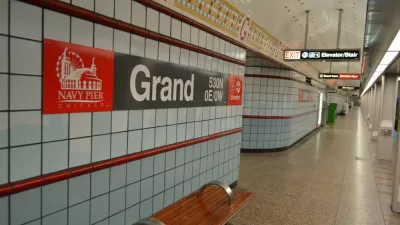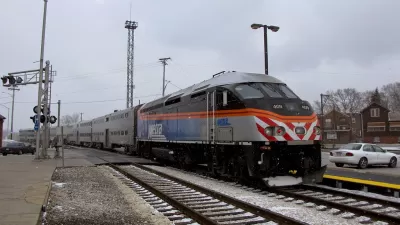The Chicago Transit Authority (CTA) in October proposed a $1.75 billion operating budget that will make it cheaper to ride transit in the Windy City.

The Chicago Transit Authority (CTA) recently proposed a $1.75 billion operating budget "that takes multiple steps to ensure that public transit remains a crucial part of the city’s continuing recovery from the COVID-19 pandemic," according to a press release dated October 21, 2021.
The budget would allow the CTA to maintain all existing bus and transit service while also proposing a "major realignment of fares and passes to better meet changing ridership patterns due to the COVID-19 pandemic," according to the press release.
The press release notes that ridership on CTAA grew throughout 2021 but still falls short of pre-pandemic levels (a pattern that is repeated in other U.S. cities, like New York City, for example). The reduced costs of fares and passes are thus intended to lure back riders who are working on flexible schedules or dealing with the economic shocks of the pandemic.
"CTA is lowering its 30-Day Full Fare pass price to $75 (from $105) and the 30-Day Reduced Fare pass price to $35 (from $50)," according to the press release. "Additionally, the CTA-Pace 7-Day pass will be reduced to $25 (from $33) to reflect the $5 premium for the shared pass with Pace Suburban Bus."
The question of how to lure riders back from catastrophic declines that date back to the earliest days of the pandemic looms over the transit planning community. Ride-hailing companies are facing their own unique problems, potentially creating an opportunity for public transit to win back some of the market share it's lost to companies like Uber and Lyft over the past decade.
An article by Brody Ford provides more details about how the CTA hopes reduced fares will respond to the pandemic's influence on transit in Chicago.

Alabama: Trump Terminates Settlements for Black Communities Harmed By Raw Sewage
Trump deemed the landmark civil rights agreement “illegal DEI and environmental justice policy.”

Study: Maui’s Plan to Convert Vacation Rentals to Long-Term Housing Could Cause Nearly $1 Billion Economic Loss
The plan would reduce visitor accommodation by 25% resulting in 1,900 jobs lost.

Planetizen Federal Action Tracker
A weekly monitor of how Trump’s orders and actions are impacting planners and planning in America.

Waymo Gets Permission to Map SF’s Market Street
If allowed to operate on the traffic-restricted street, Waymo’s autonomous taxis would have a leg up over ride-hailing competitors — and counter the city’s efforts to grow bike and pedestrian on the thoroughfare.

Parklet Symposium Highlights the Success of Shared Spaces
Parklets got a boost during the Covid-19 pandemic, when the concept was translated to outdoor dining programs that offered restaurants a lifeline during the shutdown.

Federal Homelessness Agency Places Entire Staff on Leave
The U.S. Interagency Council on Homelessness is the only federal agency dedicated to preventing and ending homelessness.
Urban Design for Planners 1: Software Tools
This six-course series explores essential urban design concepts using open source software and equips planners with the tools they need to participate fully in the urban design process.
Planning for Universal Design
Learn the tools for implementing Universal Design in planning regulations.
Caltrans
Smith Gee Studio
Institute for Housing and Urban Development Studies (IHS)
City of Grandview
Harvard GSD Executive Education
Toledo-Lucas County Plan Commissions
Salt Lake City
NYU Wagner Graduate School of Public Service





























